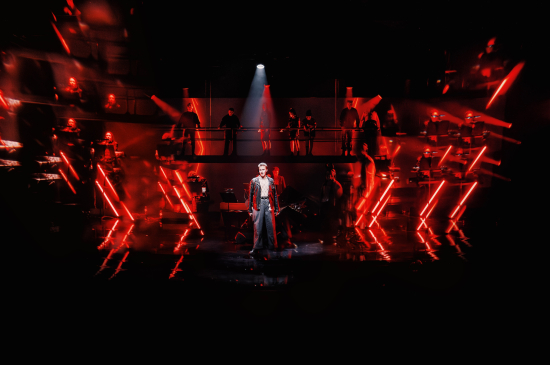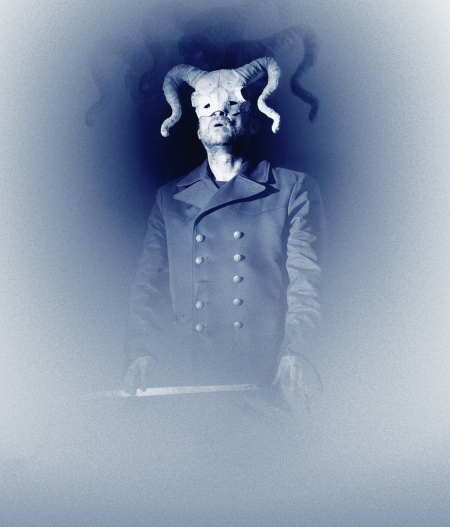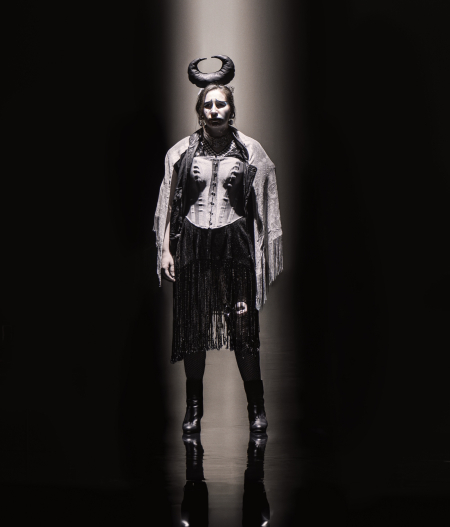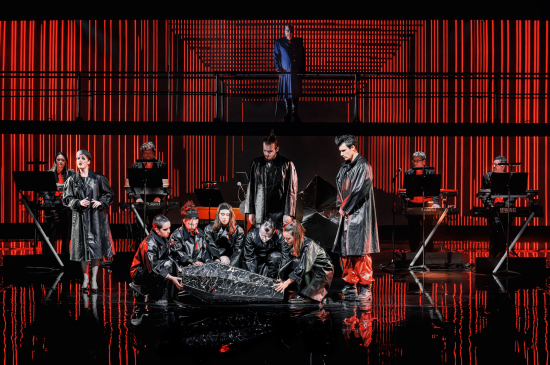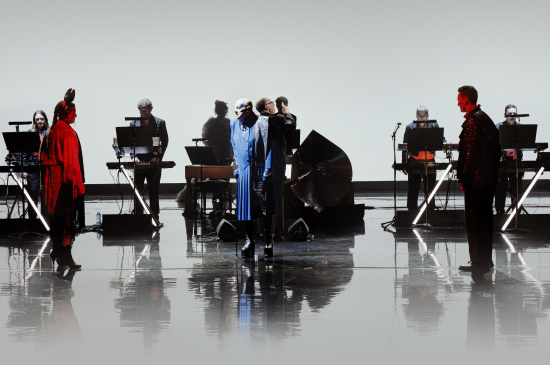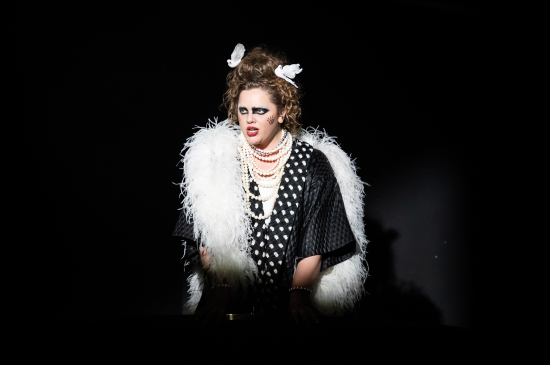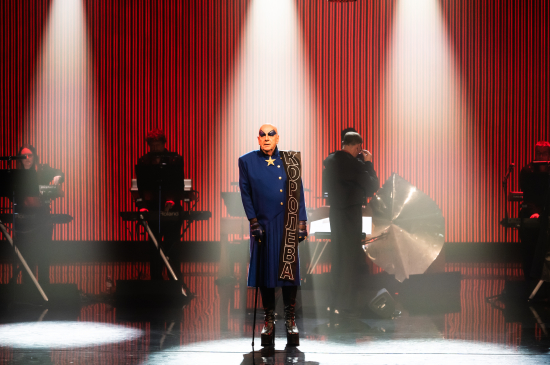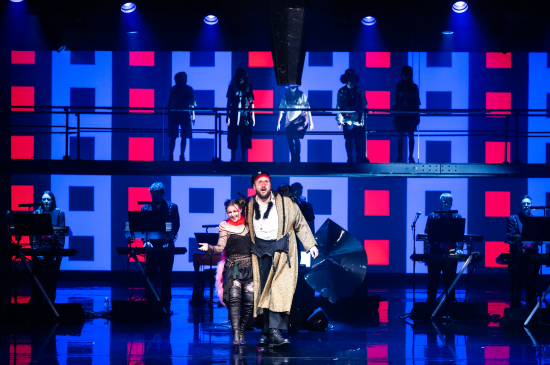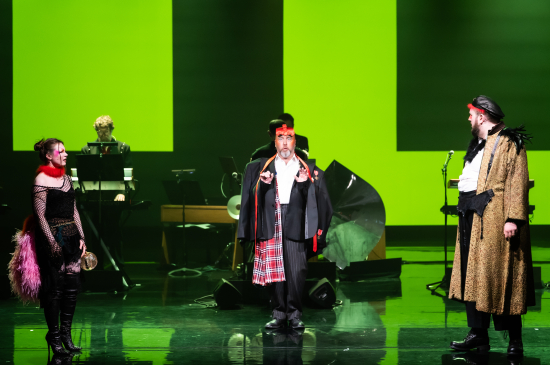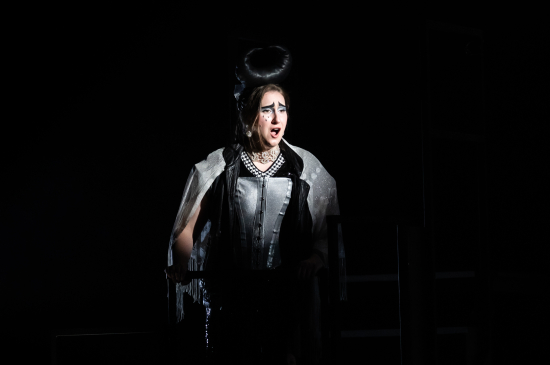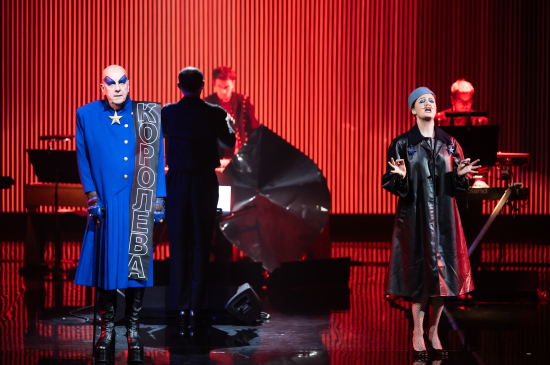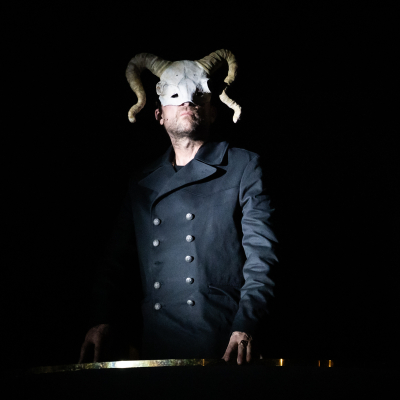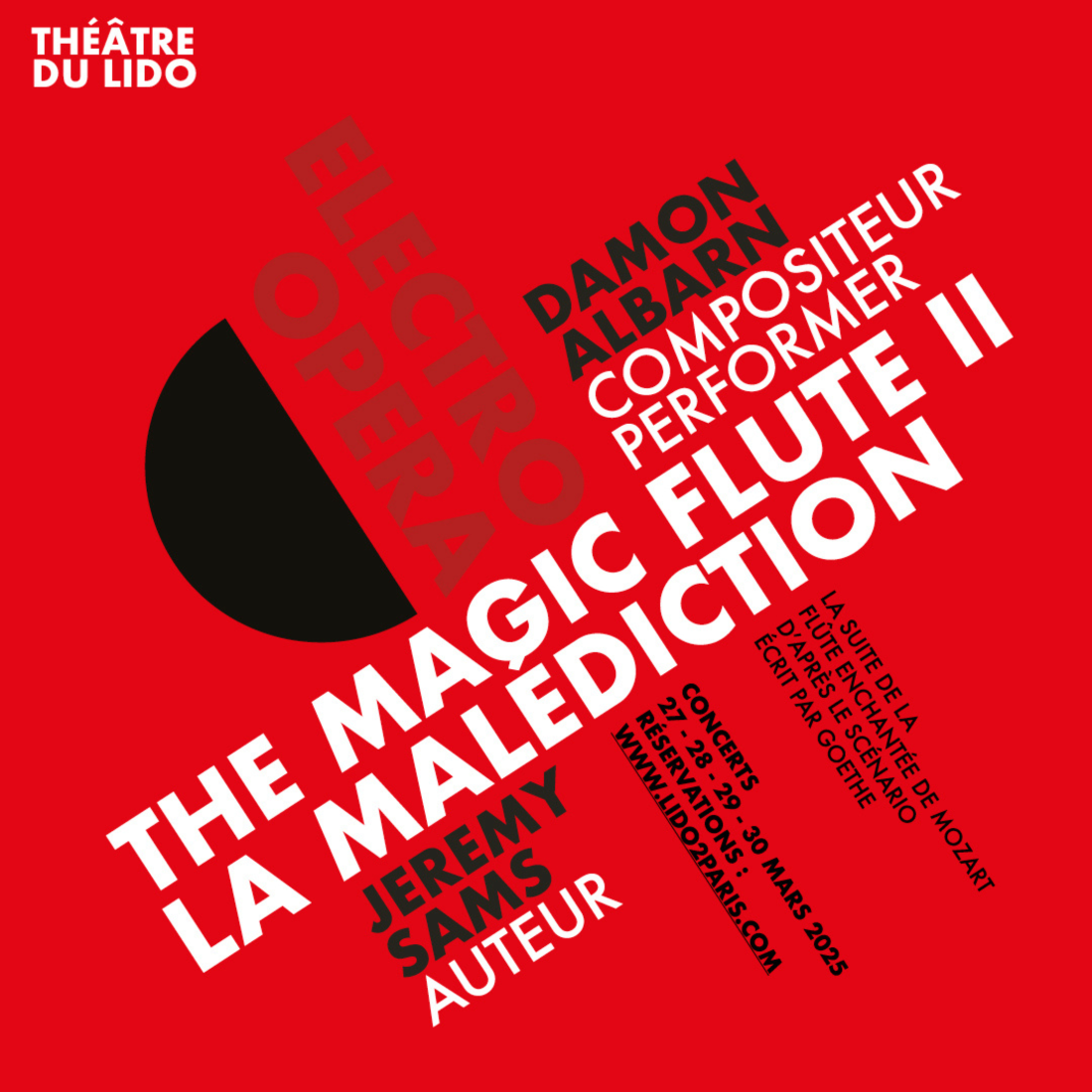
The Magic Flute II : La Malédiction
In English
The Magic Flute II : La Malédiction, an electro opera
Who knew that Goethe had written a script for a sequel to Mozart’s The Magic Flute? Jean-Luc Choplin had the idea of giving Damon Albarn, with whom he had already worked at the Théâtre du Châtelet (Monkey: Journey to the West and wonder.land), the task of writing a score based on a libretto after Goethe by Jeremy Sams.
A series of concerts of this electro score featuring the characters of the Queen of the Night, Pamina and Papageno.
Music by Damon Albarn
Libretto by Jeremy Sams, after Goethe
Directed by: Olivier Fredj
Costumes: Missy Albarn
Videographer: Etienne Guiol
Arrangements and orchestrations: Stephen Higgins and Michael Smith
Musical supervision: Michael Smith
Musical direction: Stephen Higgins
Sound designer: Unisson Design
Lighting co-creator: Julien Pichard
Costume assistants: Marion Moinet and Dorian Spiess
Sound engineer: Samuel Egglenton
Assistant Musical Director: Theo Jamieson
Assistant director: Emma Bazin
Translator: Sylvie Durastanti
REHEARSALS
THE GENESIS OF THE SEQUEL OF THE MAGIC FLUTE BY JEAN-LUC CHOPLIN
Reading Benoît Chantre’s book on Friedrich Hölderlin, Le Clocher de Tübingen, I discovered that during an evening in Tübingen attended by Hölderlin, Schiller and Goethe, the latter said he was writing a sequel to Mozart’s famous ‘Singspiel’, The Magic Flute.
This triggered my curiosity and I set off in search of Goethe’s script and sketches.
I soon became convinced that there was an opportunity to develop the opera that Goethe had dreamed of.
Namely:
A fairy tale about the initiation of a couple against the backdrop of a Masonic fable and the fascination of the time with ancient Egypt.The spirit of Martin Wieland’s fairy tales, Dschinnistan, and Jean Terrasson’s apprenticeship novel Séthos.Faust II for the end of the script.I asked Damon Albarn, the British musician and composer with whom I had already collaborated on the opera Monkey: Journey to the West and wonder.land at the Théâtre du Châtelet, to write the music for this sequel to the prequel Die Zauberflüte.
I asked Jeremy Sams, a British playwright, librettist and composer, to write the libretto for this opera in faithful accordance with Goethe’s notes.
I suggested to Damon and Jeremy that we start by presenting a semi-staged concert version before developing a stage version at a later date.
As Hölderlin and Goethe prophesied, and paraphrasing Benoît Chantre, this electro opera speaks to us of a possible ‘European night’, and at a time when glaciers are melting and cities are ablaze, this new fable is a good way to think about our world and draw a moral lesson of courage and optimism from it.
A NOTE FROM DAMON ALBARN
The idea of me writing an opera and for it to be a continuation of The Magic Flute sounds ridiculous, it was and is, not only was I grappling with the genius of Mozart but I had Goethe to contend with too !! I suppose I took a relatively reductionist approach to the question, how the fuck do I do this ? The answer came from a surprising source but one no less brilliant, Kraftwerk.
A NOTE FROM JEREMY SAMS
It was Jean-Luc Choplin that introduced me to Goethe’s proposed sequel to Mozart’s Magic Flute. To my shame and surprise I hadn’t even heard of it ! Many of Goethe’s inventions were irresistible. Papageno and Papagena producing a brood of singing bird-children. Tamino and Pamina unable, through a curse, to console each other over their stolen child…
My job was to structure this 12-page fragment into an original electro opera. And then to write verses to inspire Damon – who in turn would inspire me. Our collaboration led us into directions which would have surprised, and I hope, delighted Goethe.
From a kidnapping during a rave, via an all-seeing bird and a hysterical man-queen, to a vision of the end of the world, our sequel has turned out to be wonderfully weird – almost as weird as its original. It has surprised and delighted us.
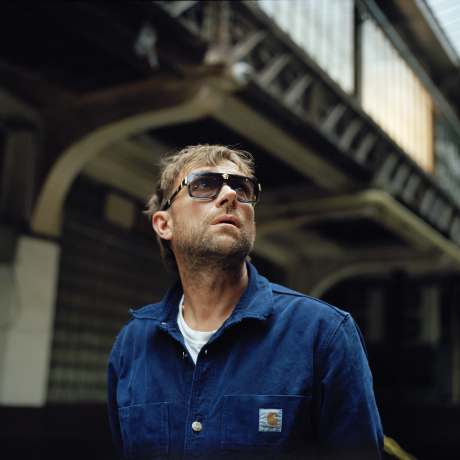
DAMON ALBARN
Musical polymathDamonAlbarn is one of the UK’s most prolific and influential artists. The creative force on over 40 albums: band projects, solo albums, collaborations, operas and film soundtracks. The singer and songwriter of blur, Gorillaz and more, he is the recipient of sixBRIT Awards, twoIvor Novellos and two GrammyAwards.blur’s debut Leisure in 1991 marked the start of an extensive and eclectic career. Iconic works for blur and later Gorillaz are interspersed withwriting for film soundtracksincluding Ravenous(1999), 101 Reykjavík (2001)and Broken (2012). An Oxfam commission gave rise to the transformative Mali Music (2002) made in Bamako with Afel Bocoum & Toumani Diabaté , and Kinshasa One Two(2011). Then, with Africa Express, came Maison De Jeunes(2013) and Egoli (2019), as well as the formation of The Orchestra of Syrian Musicians for an eponymous studio album and the opening slot at Glastonbury Festival in 2016. Albarn’s first full opera Monkey: Journey To The Westdebuted at Manchester International Festival in 2007 and was followed by the operas and musicals Dr Dee(2011),Wonder.land(2015) and most recently, Le Vol du Boli (2021). In addition to ninestudio albums with blur and eightwith Gorillaz, Albarn has also recorded twoalbums with The Good,The Bad & The Queenand twosolo albums, the Mercury Prize-nominated Everyday Robots(2014) and The Nearer The Fountain, More Pure The Stream Flows(2021).He has also produced for multiple artists from Kano to Amadou & Miriam, and most proudly,wroteand producedBobby Womack’s final album The Bravest Man In The Universe, released in 2012
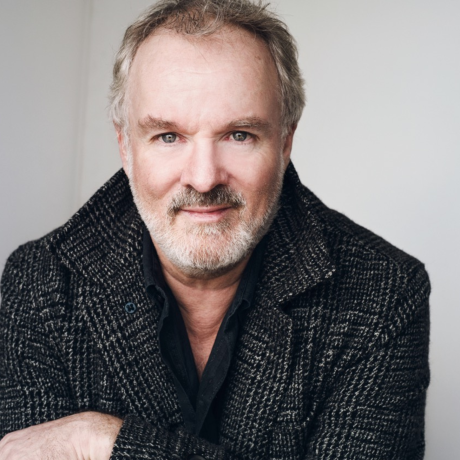
JEREMY SAMS
Theatre director, lyricist and translator of plays and opera libretti as well as a composer, orchestrator and musical director, Jeremy Sams is the ultimate polymath. Born in 1957, Jeremy studied Music, French and German at Magdalene College, Cambridge, and Piano at the Guildhall School of Music.
Jeremy’s film composing credits include the BBC adaptation of Jane Austen’s Persuasion, for which he won a BAFTAaward for ‘Best Music’. Jeremy has worked on a series of films by award-winning director by Roger Michell. For The Mother, starring Anne Reid and Daniel Craig and which won the Director’s Fortnight at Cannes in 2003, Jeremy created a jazz-style score. In 2005 Jeremy wrote the score for the screen adaptation of Ian McEwan’s Enduring Love – winning the 2005 Ivor Novello award for ‘Best Score for a Feature Film’. Jeremy again worked with Roger Michell on Hyde Park on Hudson, starring Bill Murray and Laura Linney, and on Le Week-End, starring Jim Broadbent and Lindsay Duncan.
Jeremy has composed the theatre where he also has many directorial credits, including The Wizard of Oz (London Palladium), The Sound of Music (London Palladium, Princess of Wales Theatre Toronto) and Noises Off (National Theatre), and is well known for his stage adaptations, including Chitty Chitty Bang Bang (London Palladium) and Little Britain. He wrote the libretto for This Enchanted Island (Metropolitan Opera, New York).
Jeremy’s many translations include Mozart’s Figaro’s Wedding, La Boheme, The Magic Fluteand Wagner’s The Ring Cycle (ENO); The Merry Widow (Covent Garden); and Les Parents Terribles, The Miser and Mary Stuart (Royal National Theatre).
DISTRIBUTIONS
- Christopher Robson : Queen of the Night
- Richard Burkhard : Sarastro
- Elizabeth Karani : Pamina
- Alfred Mitchell : Tamino
- Anna Gregg : Papagena
- Hugo Herman-Wilson : Papageno
- Phoebe Rayner : Monostatos
- Lydia Shariff : Bird
Choristers
- Handel-Hendrix Academy Choir
- Choir of the Maitrise des Hauts-de-Seine
Musicians
- Thomas Bloch : Cristal Baschet et Ondes Martenot
- Dan Moore : Keyboard
- Henry Bowers-Broadbent : Keyboard
- Ruth O’Mahony Brady : Keyboard
- Theo Jamieson : Keyboard
- Mike Smith : Keyboard
